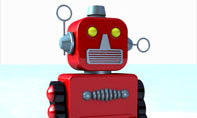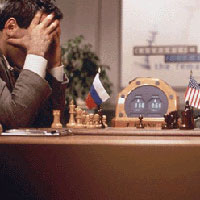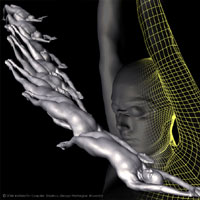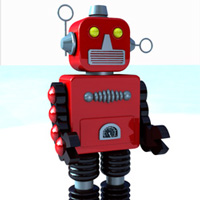- About Us
- Columns
- Letters
- Cartoons
- The Udder Limits
- Archives
- Ezy Reading Archive
- 2024 Cud Archives
- 2023 Cud Archives
- 2022 Cud Archives
- 2021 Cud Archives
- 2020 Cud Archives
- 2015-2019
- 2010-2014
- 2004-2009
 |
System Error Required |
Among my various photo-albums and pictures of parties, weddings and holidays, there is one photograph that I never get tired of looking at. I took it a few years ago while on holiday and though, to the uneducated eye, it appears to be nothing more than a lump of white plastic upon a table, it is in fact a perfect summary of how I feel about the future.
How so, you ask? How can this simple, slightly blurred photograph mean so much?
Well, it’s like this. The picture was actually taken in the Sony Headquarters in Tokyo. This is a rather large and impressive building which, for someone who ‘works with computers’, is a place I felt I should visit as something of a pilgrimage. I wandered around the first few floors and took in the various hi-resolution screens and televisions that were so flat they started to make the wall look a little uneven, before reaching floor four: robotics.  This was more like it- this was the future as only the Japanese could do it. With camera clutched in my sweaty palm, I headed into the main display area. And there it was: Teckno One, in all its glory. Except it wasn’t. Teckno wasn’t looking too bright today. In fact, Teckno –whose design roughly resembled a dog– was splayed out, motionless, on all fours with a small, blinking LED light that happily boiled the whole thing down into one very accurate word: ‘ERROR’. A wide grin spread across my face as I quickly took a few snaps. Every ten seconds or so Teckno’s four legs would burst into life and attempt to raise the mechanical marvel, only to be interrupted by a sharp, piercing whistle and a slow return to its former position. It was one of the most satisfying things I have ever seen. Here I was, in the very heart of the technological dream and what did I find? A broken piece of rubbish. I almost started looking for the curtain and the Wizard.
This was more like it- this was the future as only the Japanese could do it. With camera clutched in my sweaty palm, I headed into the main display area. And there it was: Teckno One, in all its glory. Except it wasn’t. Teckno wasn’t looking too bright today. In fact, Teckno –whose design roughly resembled a dog– was splayed out, motionless, on all fours with a small, blinking LED light that happily boiled the whole thing down into one very accurate word: ‘ERROR’. A wide grin spread across my face as I quickly took a few snaps. Every ten seconds or so Teckno’s four legs would burst into life and attempt to raise the mechanical marvel, only to be interrupted by a sharp, piercing whistle and a slow return to its former position. It was one of the most satisfying things I have ever seen. Here I was, in the very heart of the technological dream and what did I find? A broken piece of rubbish. I almost started looking for the curtain and the Wizard.
Now, the reason I find this to be so significant is that this demonstration of failure is a welcome relief from the very serious affect of the onslaught of technology. I mean it. Think these are the ramblings of some back-to-the-trees old hippy? Well, you’re partly correct, but allow me to at least attempt to present my case.
Exhibit A: Chess. Oh yes, we can get nerdy all right. I’m not proud but it is a fact that yes, I used to enjoy chess. Used to sleep with a board next to my bed as a matter of fact but caring doctors and strong medication have solved that little issue. Now the thing with chess is that when I was young I used to enjoy playing against various friends and family members however they did not all share my enthusiasm for the game and, as shocking as it may seem, would often avoid the opportunity to play me. Solution: chess computer. Small plastic set with a few buttons and two double ‘A’ batteries, and I was happy as Larry. This was fine for a few months but eventually I worked out how to beat my microchipped opponent. A simple bishop sacrifice on move six left my adversary reeling such that victory was always assured. It’s a rather sad footnote that despite this invincibility I still continued to play with the thing for several weeks – you’d think I’d get bored but hey, a success is a success and when you’ve been sleeping with a chess board for a while you don’t have an awful lot else to hang your achievement hat on.
 Now then, all this is relevant because a few years ago the world chess champion, Gary Kasparov, was beaten by IBM’s Deep Blue supercomputer (I’m not sure what the difference between a normal computer and a supercomputer actually is but I’m guessing that capes are, sadly, not part of the picture). This was historic. Kasparov was arguably the greatest person ever to have played the game. He wasn’t just another good player, he was probably the greatest we, the human race, have ever had to offer. And the supercomputer beat him. A large lump of metal and plastic was able to outwit and outmanoeuvre this god of strategy. And while the world’s press duly reported it and the event did make the cover of a few daily newspapers there wasn’t really much of a hullabaloo.
Now then, all this is relevant because a few years ago the world chess champion, Gary Kasparov, was beaten by IBM’s Deep Blue supercomputer (I’m not sure what the difference between a normal computer and a supercomputer actually is but I’m guessing that capes are, sadly, not part of the picture). This was historic. Kasparov was arguably the greatest person ever to have played the game. He wasn’t just another good player, he was probably the greatest we, the human race, have ever had to offer. And the supercomputer beat him. A large lump of metal and plastic was able to outwit and outmanoeuvre this god of strategy. And while the world’s press duly reported it and the event did make the cover of a few daily newspapers there wasn’t really much of a hullabaloo.
But hang on a second here: if the computer is now smart enough to beat us at chess, then what is the point in us playing the game anymore? I mean, that’s it; it’s been solved. Yes, we can organise playoffs between IBM’s Deep Blue III and Sun Microsystems’ Goliath IV, or whatever names they give these beasts, but it’s still going to be a computer that wins. And isn’t that sad? No more of us puny humans battling it out over such an innocent pastime? In the 1978 world final between Karpov and Korchnoi they had to place a wooden barrier under the table between the two players to stop them kicking each other. Isn’t that great? That two Grandmasters who had worked so hard and achieved so much were nonetheless reduced to taking swipes at each other under a desk! But that’s all gone now. Now we’re just going to have a cold printout of the moves between two machines and there is a good chance the game itself will be forgotten to history.
Ok, maybe I am being too melodramatic here. Maybe people will continue to enjoy chess and it is not the rise of the machines that I’m suggesting. But what about films, eh? What about the whole Hollywood situation? No? Not with me? Well try this on for size – computer actors. What about that? According to the experts, the enormous processors that are used to create these computer animated films are soon going to be so powerful that they will be able to accurately depict a human form so precisely that the average Joe in the street will not be able to tell the difference. Now that’s amazing. No more James Deans or Marilyn Monroes? No more cute little Tom Cruise smiles or Darryl Hannah’s body? Just a load of bits and bytes flying around creating images of people we will probably end up worshipping just like today’s stars. From the studio’s point of view this is great news. No more enormous wages to have to hand out. No more profit cuts eating into their budgets. Now actors will be on time and available 24 hours a day, 365 days a year. They will do exactly what is required and it will be the writers and programmers who will give them a personality. So that’s it. No more chess and no more human actors. Now do you see my cause for concern?
 I’ll take this one stage further as I see you are becoming alert to the danger. What about music? What if -and you need to follow me closely on this one- what if they solve music, just like they did with chess? Let me explain. The human mind is essentially a lot of synapses and nerve endings that interact via electrical signals. Though it’s still early days on us working out how the brain works, we can now detect and map what some of the connections actually do. For example, when we’re under a lot of stress, or feeling euphoric or any heightened emotional state, the activity of various areas of the brain lights up. In a similar vein, when we listen to certain types of music our brain responds accordingly. A blast of Mozart’s Jupiter symphony will cause the mind to become alert and excited whilst anything by Sadé makes us want to kill ourselves. Well, just kidding, but you get my point. Our mood is altered at a very basic level by music. Therefore, what happens if some bright spark looks into this and starts working out how notes, rhythms and chord progressions affect our mood? What if they start to work out that a simple pentatonic scale in the key of C sharp with a 4/4 beat will cause our relaxation synapses to respond? Then they add melodies and timbres and all the other aspects of what we think of as music to the mix until eventually you are left with a machine that will simply be a ‘mood alterer’. The true meaning and life that exists within music as we know it today would be gone. Instead we would be left with a simple ‘tune-fix’ that would affect our emotions in whatever way we wished. So there it is – music would be ‘solved’.
I’ll take this one stage further as I see you are becoming alert to the danger. What about music? What if -and you need to follow me closely on this one- what if they solve music, just like they did with chess? Let me explain. The human mind is essentially a lot of synapses and nerve endings that interact via electrical signals. Though it’s still early days on us working out how the brain works, we can now detect and map what some of the connections actually do. For example, when we’re under a lot of stress, or feeling euphoric or any heightened emotional state, the activity of various areas of the brain lights up. In a similar vein, when we listen to certain types of music our brain responds accordingly. A blast of Mozart’s Jupiter symphony will cause the mind to become alert and excited whilst anything by Sadé makes us want to kill ourselves. Well, just kidding, but you get my point. Our mood is altered at a very basic level by music. Therefore, what happens if some bright spark looks into this and starts working out how notes, rhythms and chord progressions affect our mood? What if they start to work out that a simple pentatonic scale in the key of C sharp with a 4/4 beat will cause our relaxation synapses to respond? Then they add melodies and timbres and all the other aspects of what we think of as music to the mix until eventually you are left with a machine that will simply be a ‘mood alterer’. The true meaning and life that exists within music as we know it today would be gone. Instead we would be left with a simple ‘tune-fix’ that would affect our emotions in whatever way we wished. So there it is – music would be ‘solved’.
Frightening, isn’t it? How plausible these babblings become when you don’t get a chance to think about the subject logically for a second? The thing is, what has really got me quite concerned, is that though the little episode at the Sony building took place about three years ago, I recently saw a programme about state of the art robotics and I have to tell you, they’re not nearly as wobbly and crap as they used to be. Now they look like us. They’re walking upright and able to carry things. In one demonstration they were even doing a basic dance step. I’m serious: dancing robots. It’s here. And I’m not laughing any more. After all, they can only get better. Soon, the scientists confidently predicted, they will be able to respond to voice instructions and have their own basic vocabulary. Staircases are fast being overcome and running is seen as the next evolutionary step. Quite frankly, I wouldn’t be surprised if the Foxtrot does not follow soon after.
Sorry? Over reacting? Do you think so? You could be right. Part of me likes to think that for all this hi-tech future the only real impact we will actually come into contact with will be something like the self-monitoring fridge. You know the kind of thing- as soon as you run out of a certain provision a text message will be sent to your mobile informing you that you need to go shopping. We’ll spend hours of our lives muttering back at our household appliances, “Why don’t you get the milk if you think we need more” and “I know, I know– ‘seatbelt not fastened, seatbelt not fastened’ ”. This is a more likely future, I agree. And I would certainly welcome it when compared to its opposite number. I would hate a future in which people no longer play games, one where there are no actors whining about their ‘issues’ and where the beauty of music is replaced by some cold, heartless, brainwave device. Put simply, I’d rather be going into space with Chewbacca than Spock. Steady now, I’ve thought about this.
 You see, things have to break and it has to be messy some of the time. It’s human, yet for some reason we are continually accepting of the suggestion that the future will somehow always be some standardised homogeny. I like to term this ‘the Star Trek and the Star Wars ideals’ (told you it would get nerdy). Simply put, the Star Trek world is very organised. Everyone wears the same clothes and eats from a machine. The ships are incredibly clean and tidy and all humans are part of an omni present ‘Federation’. Fine, but does that sound just a little National Socialist to anyone else? In the Star Wars future, things break. Machines are not reliable and the ships are not well maintained and they do indeed have oversized buttons and levers. As a result it looks like a fun place to be. Things need to break, to go wrong and let us down, otherwise there is no humour or irony in the world. It would be a little like the west coast of America.
You see, things have to break and it has to be messy some of the time. It’s human, yet for some reason we are continually accepting of the suggestion that the future will somehow always be some standardised homogeny. I like to term this ‘the Star Trek and the Star Wars ideals’ (told you it would get nerdy). Simply put, the Star Trek world is very organised. Everyone wears the same clothes and eats from a machine. The ships are incredibly clean and tidy and all humans are part of an omni present ‘Federation’. Fine, but does that sound just a little National Socialist to anyone else? In the Star Wars future, things break. Machines are not reliable and the ships are not well maintained and they do indeed have oversized buttons and levers. As a result it looks like a fun place to be. Things need to break, to go wrong and let us down, otherwise there is no humour or irony in the world. It would be a little like the west coast of America.
Not so long ago we were told that the future was bright, the future was Orange. That’s fine, but can there be a smudge on that future, please?
Professionally, M. Whyte does something with computers but does not really understanding how they work. For more information please visit www.xs4all.nl/~whytem
